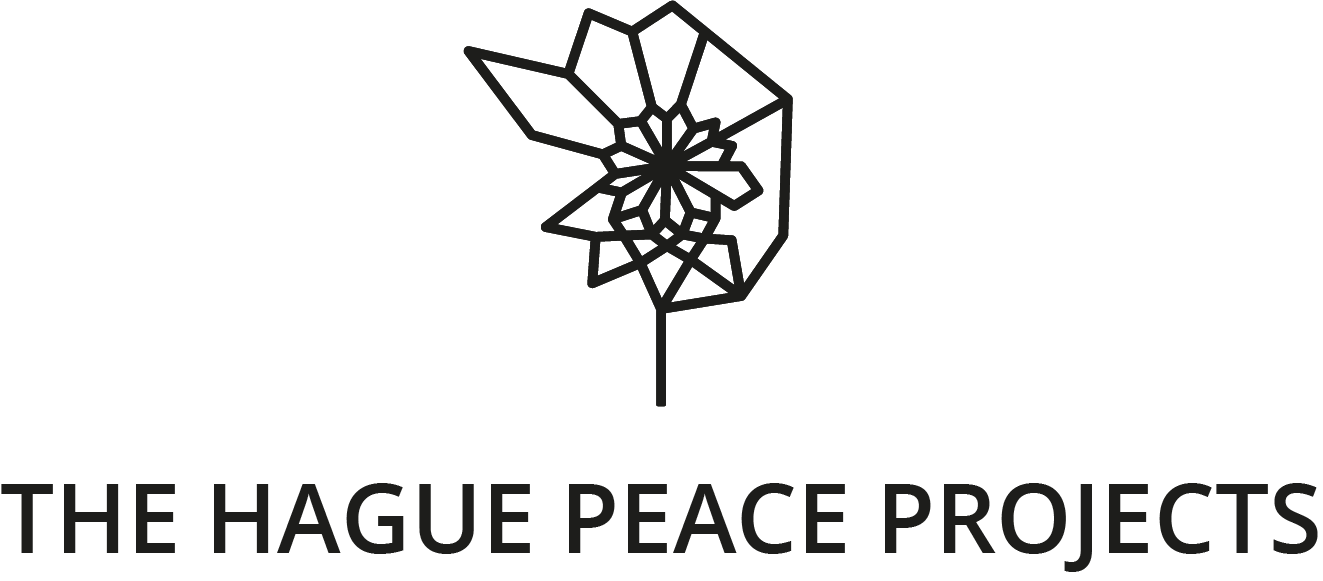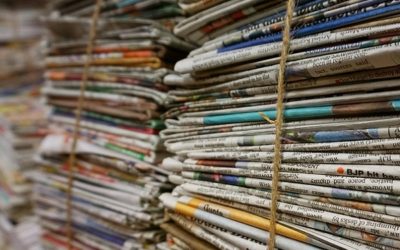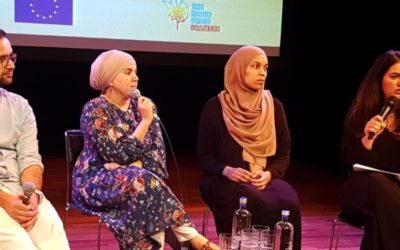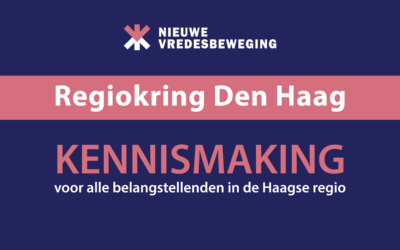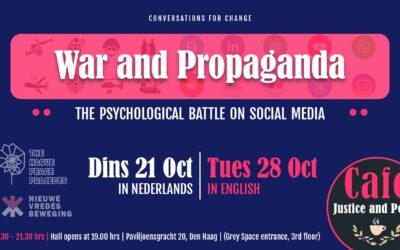PART 1
23 – 27 July 2018, Caux (Switzerland)
From the 23rd until 27 july a group of 15 Armenians, Kurds and Turks from Lebanon, The Netherlands and Armenia participated in the Initiatives of Change (IoC) program ‘Addressing Europe’s Unfinished Business (AEUB) at Caux Palace (Switzerland). Amongst the 15 participants there were individuals who already knew each other from the dialogue in 2016 and 2017: the Just Governance for Human Security program of IoC. This year there were new participants who heard about the dialogue initiative from the previous years.
This year’s dialogue took place in the framework of ‘Addressing Europe’s Unfinished Business’. From the introduction paper:
‘Europe in 2018 continues to face a number of challenges: migration, the rise of populism, terrorism, Brexit and relations with the Russian Federation are foremost among them, placing pressure on communities and nations within and across Europe. As a result of some of these challenges, questions of identity, nationalism, citizenship, racism, xenophobia and the legacy of colonization have arisen. Ordinary people need to feel that they can shape their own futures and make a difference.’
‘Addressing Europe’s Unfinished Business’ 2018 will focus on equipping delegates with the skills needed for developing social cohesion, trust and dialogue during these tumultuous times. We have invited some inspiring thinkers and trainers from Europe and beyond who are keen to transmit their skills to those committed to developing and healing their communities.’
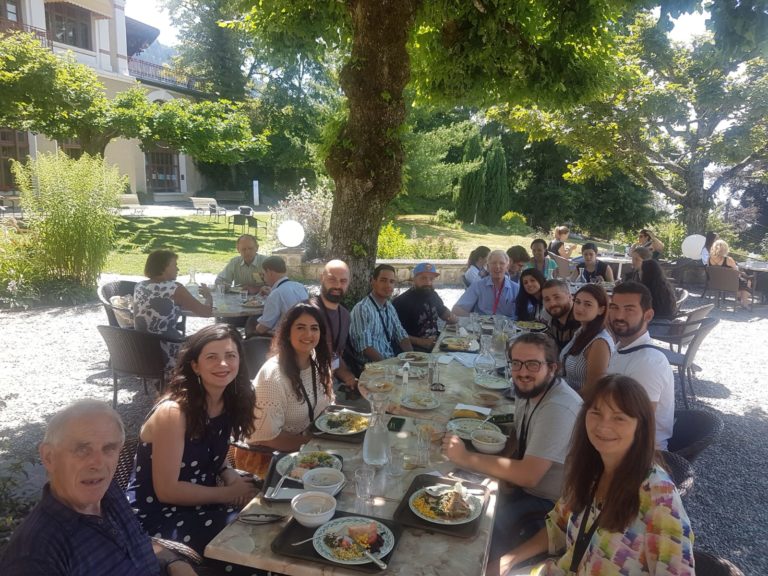
Day 1 – Introduction to Caux and all the participants
For the third year in a row the mixed Dutch group from The Hague Peace Projects joined an event of the Initiative of Change. When we took our place at the side of the main hall, the moderator Diana Damsa was asking participants ‘to say hello in their own language’. We counted 13 different hello’s. After the interaction with the participants (181 people from 32 different countries in total) the event could really kick-off.
Young Ambassadors Program & Learning to be a Peace-Maker
Several speakers from the Young Ambassadors Program (YAP) of Initiatives of Change, talked about an ‘European Peace Voyage’ (through France, Germany, Serbia, Croatia and Bosnia) dealing with the repercussions of the Balkan war in the nineties of the previous century.
The next speaker, Marwan Bassiouni with Swiss, American, Italian, Egyptian and Dutch roots (!) introduced the program ‘Learning to be a Peace-Maker’ for young European Muslims. Bassiouni: ‘We as European Muslims face challenges with regards to the essence of our religion and the tensions that spread from it between us and non-muslims. Mediation and co-existence is something we should strive for.’ A musical intermezzo took us to the year 1948. A song written by French people in Caux, to welcome their former enemies: the German delegation.
Tatjana Peric, Lord Ashdown
Right after the music the floor was open for Tatjana Peric (Bosnia), advisor on Combating Racism and Xenophobia, and working for the Organization for Security and Co-operation in Europe (OSCE). ‘The first time in Caux for me was in 1996, I came as a refugee from the Balkans and was really energized by the Caux spirit. I made plans to encourage the East-West dialogue.’ Later Peric joined the OSCE, collecting evidence for reports about hate crimes in Europe. ‘Last year there were 2154 racist and xenophobic incidents in Europe… And underreporting is still a problem. In Europe we can see a dangerous merger of anti-migrant feelings with racism.’ Furthermore, Peric emphasized the importance of platforms for young people to empower them, assist each other, build coalitions between organizations and to work internationally. ‘For the work we do, prevention is the best cure.’
Lord Ashdown, a politician from the UK, talked with force about the aggressiveness and vulgarity of president Trump. He worried whether Europe would stay together. ‘Ash and blood’ would be the alternative of a possible break up of Europe. The explanation he gave for the rise of populism in Europe: shifting powers from West to East, which is also a shift of capital. ‘We are facing the ending of 400 years of Western hegemony. A multipolar world is taking form, so it’s time to return to diplomacy. We live in a deeply interconnected world, where we share a destiny with our neighbor, even if they are our enemy.’ In this context, he also mentioned ‘second-generation immigrants’ and ‘terrorism’ in one sentence. In the q&a he would be questioned about this association. Lord Ashdown acknowledged immediately that we should also be more inclusive in our language. ‘I never talk about Western values, we have universal values.’
Dinner and introduction to how things work at Caux
So Caux started with a good discussion. After dinner we were introduced to the history of Caux and how things work here. After plenary meetings, there are community groups with different themes like empathy or courage, where people can hear each other’s story in a more smaller, personal and intimate setting.
Last year we had a meet-up between Armenians, Kurds and Turks on the first day. This year we agreed to do that on the first session on Tuesday at the allocated time and place.
DAY 2 – Inspirational speeches and Armenian-Kurdish-Turkish dialogue meeting
Syrian refugees in Turkey
Emel Topçu, Associate Professor at Hasan Kalyoncu university in Gaziantep, gave a presentation about Syrian refugees in Turkey. In Kilis, for instance, before the Syrian war broke out, the inhabitants’ number was about 80.000. Now it’s a city with more than 220.000 people. Consequently, the Syrian influx has had an huge impact on the receiving Turkish society. It also led to a Turkish xenophobic and nationalistic backlash with reactions like ‘Our children are dying in the war, why are Syrians lying on the beach?’, ‘They are partying at the sea’ or ‘They must respect the owners of the country.’
Topçu blamed some media, mainly linked to opposition parties, of speculating about a ‘potential conflict’ or ‘clash’ in Turkey, due to government policy on Syrian refugees. But Topcu was happy to say that ‘we didn’t have a clash with Syrians’. She gave two reasons for the prevention of such a conflict: ‘(1)The role of relatives and (2) civil society. 1.
Topçu: ‘The first reason is that we have a shared history. 100 years ago we belonged to the same country, The Ottoman Empire, before the Sykes-picot agreement divided us. And families got split across the borders. The second factor is the role of Women volunteers who engaged in trust building activities between Turks and Syrians.’
Independent media under pressure in Ukraine
Not everybody in the room agreed with Topçu’s story, but the next speaker, Oleksiy Matsuka from the Ukraine, was already underway delivering his talk about the conflict in East-Ukraine, which started in 2014. ‘The Eastern part is occupied, and the Crimea is annexed by Russia. We don’t recognize them, and call them separatists.’ Matsuka want attention for independent media who are under pressure. ‘A lot are closed down. There are no journalists who’s life has not changed in the Donbass region. This is why we decided to come to Caux. To talk about the very polarized situation in Ukraine.’
Matsuka: ‘As a journalist, I ask questions. I changed the tone form affirmative journalism to interrogative journalism. The reactions of the speakers changed. Uncomfortable moments are many. To doubt everything is important for a journalist.’
Being a neo-nazi in Sweden
The last speaker of the morning plenary was Peter Sundin, a former neo-nazi in Sweden. His personal story was listened closely by the audience. He told the public about his single mother, with five children and her work as a cleaner. ‘We were a poor Swedish family and blamed our economic situation on foreigners, saying they took our jobs.’
He saw his older brother as a ‘role model’. A skinhead who listened to white power music. ‘We said that the holocaust was a fraud, a made-up story to sneer on national-socialism.’ He wasn’t much at school and joined the ‘national youth’, a violent movement. When they were at school, they were confrontative, ‘we felt backed up by this group.’
Not much later, he was involved in a situation which led to the worst decision in his life. They beat up a guy and Peter punched a guy in his face. He was unconscious. ‘When he gained his consciousness, I ran back and jumped full power on his back and landed on his shoulder blade. My friends tapped me on the shoulder.’
‘The next morning I got a phone call. We were on the news. That was the moment I realized it was enough. That was the starting point of a five year long journey for deradicalization. I completely transformed my lifestyle. I had to cut ties with my family. Drop the nazi belief system, and was looking for new world perspectives. I started to watch other channels, things that I called jew-news before..’
‘I spend six months in prison for assault. Now I’m helping youngsters, so they won’t commit the same mistakes I did. Behind every opinion is a human being. So don’t only see the opinion, see also the human. Lets shift the focus on the individual. To change a opinion is an individual process.’
Everybody left the main hall with all these stories in their mind. The community group for reflection was much needed.
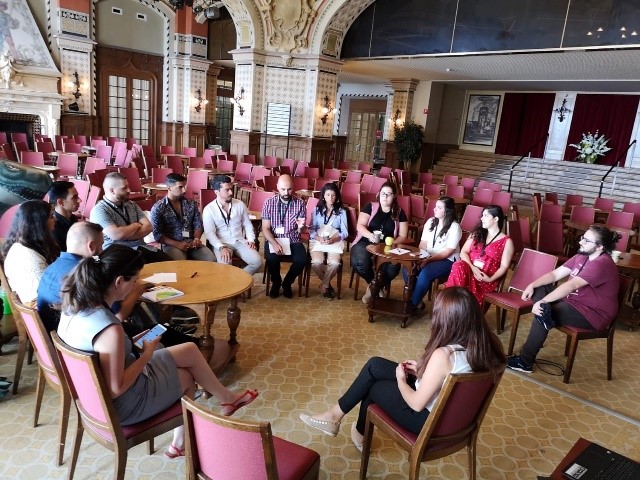
Lunch and first Armenian-Kurdish-Turkish (AKT) dialogue meeting
After lunch, this year’s Armenian-Kurdish-Turkish dialogue started with an introduction round in which some just told their names and where they came from, and others who elaborated on, for instance, their expectations.
One participant put the emphasis on ‘young people’ and wondered ‘whether Turks and Armenians can be friends’. Another uttered strong wishes of ‘a follow up right after Caux’, and whether the discussion can ‘move beyond the blaming game and try to have a grip on the whole picture’. Furthermore, it was been said that ‘dialogue within communities’ is also important, and in addition to that, ‘that it is necessary to reach out to groups who never come together in circles like these’. Another participant complained about the problematic sides of ‘living locally’, while the world is moving on, ‘new approaches should therefore be worldwide’. The role of ‘privileged diaspora’ to put up grassroots dialogue initiatives like these was underlined and another participant ‘discovered’ that these dialogue-sessions can have a ‘healing’ effect. An ‘action-plan’ should come off the ground this year, ‘but sometimes it feels like impossible in Lebanon’. The last participant in the circle mentioned the links of Armenian and Kurdish communities in her family.
Film by Lebanese group
After the introduction round, we watched a short film made by the Armenian-Lebanese participants of 2017 of which some were partly present again this year. The film, in which all participants agreed that a genocide had taken place, triggered a question to the group ‘whether everybody in the room was on the same page about the Armenian genocide?’
An intense debate about the term genocide followed and whether ‘Armenian Muslims’, ‘who were targeted by Armenians during the genocide (according to one of the participants), were also included as victims?’
This counter-question led to another discussion whether there were actually ‘Armenian Muslims’ before the genocide, or that they were a result of the Armenian genocide, in which Armenians were forced to become Muslims and live in Muslim-households.
Since the question of recognition is one of the most sensitive issues in Turkish-Armenian dialogue, we accepted that we heard the question and that in the following days everybody can individually decide whether he or she wants to give an answer or not.
Then one of the participants said about Armenians that ‘they were stuck in 1915’ and asked ‘How is that possible?’ One answer was that the Armenian identity was almost totally based on what happened during the war. ‘As an Armenian you cannot escape it’. The need of closure is there. And that can not begin, without justice and admittance.
Besides, or linked with ‘being stuck’, is the issue of ‘global citizenship’. A lot of peoples are afraid of the outside world. Identity and national citizenship are strong and people want to keep that alive, as a defense system for the unknown outside world.
The closing statements of this first session was that the border is closed between Turkey and Armenia.
Again, we had an interesting first encounter. But in the evening, we had an informal meeting at Caux station, in which dance-styles of several regions were performed. ‘Before I went to Caux, I never thought I would dance with Turks’, was said by an Armenian participant.
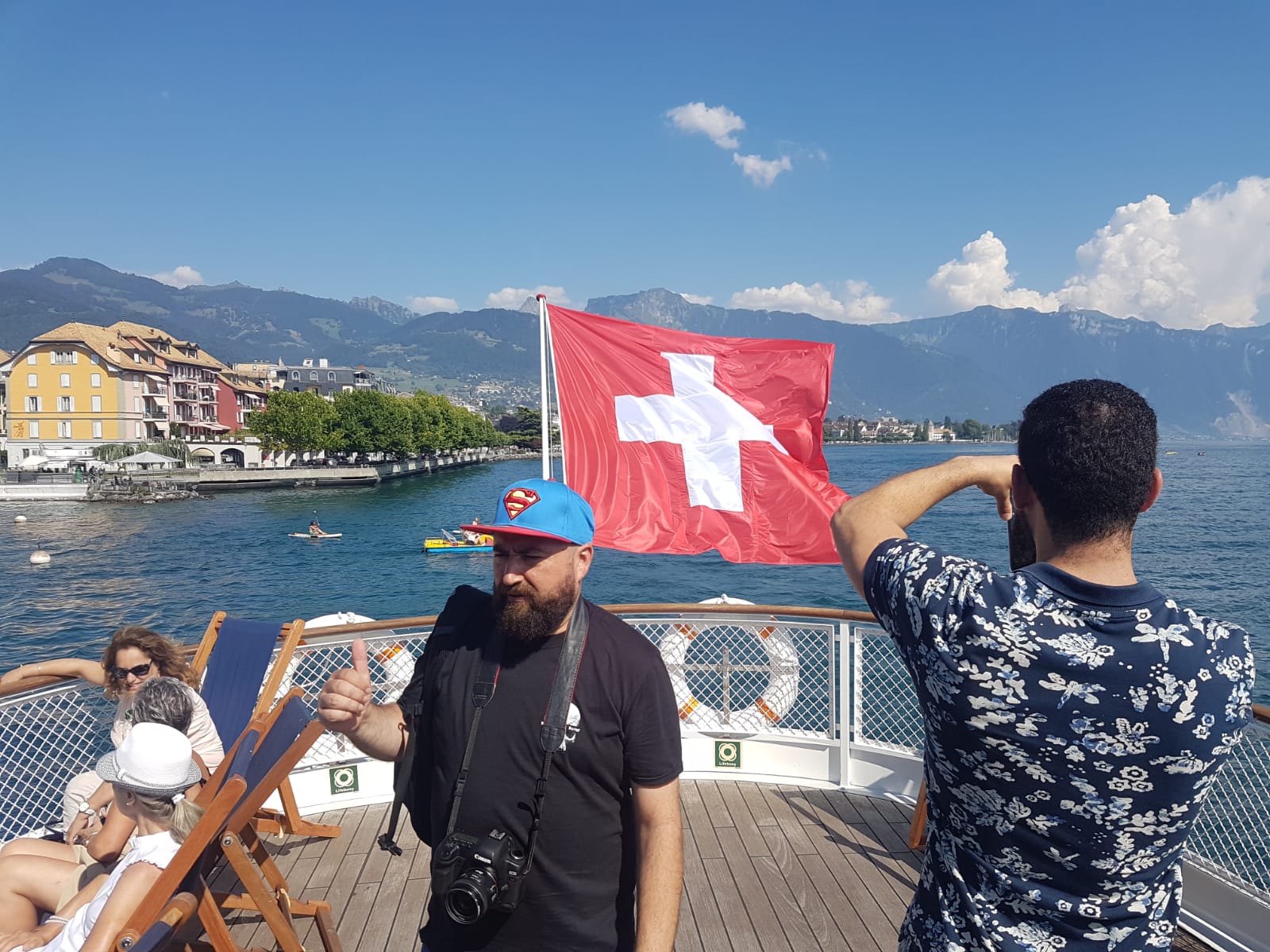
PART 2
From the 23rd until 27 july a group of 15 Armenians, Kurds and Turks from Lebanon, The Netherlands and Armenia participated in the Initiatives of Change (IoC) program ‘Addressing Europe’s Unfinished Business (AEUB) at Caux Palace (Switzerland).
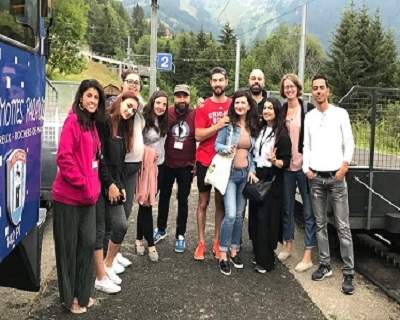
Day 3 – Presentation The Hague Peace Projects and next steps
In the Caux programs everybody is required to submit to a ‘community group’ with different theme’s. The community groups are for personal reflection in a small setting and to coordinate the kitchen duties. These are really interesting moments for reflection and inspiration, but since these gatherings are confidential, we cannot report about it.
After the community group and breakfast, the main hall was reserved for 16 key initiatives of ‘Building social cohesion in Europe’. The coordinators were asked to give a one minute plenary introduction, so participants could have an idea and decide whether they want to hear more about it in the next hour. There were three sessions from ten minutes each, to ask questions about the why, impact, key insights and next steps of the initiatives.
A quick summary of the ‘Armenian-Kurdish-Turkish diaspora dialogue in The Netherlands’ initiative:
Why: There is no dialogue and contact between communities since 2015, when the war broke out between Turkey and the PKK, after the peace process (2012-2015) failed.
Impact: It’s a small volunteer initiative in The Netherlands with incidental (project-based) funding, but there is a growing line. Talks with municipalities, ngo’s and self-organizations to reduce tensions between communities are gaining ground.
Key insights: Personal stories are a powerful method to ignite connection between people, without neglecting sensitive political questions.
Next steps: Talk with Dutch Members of Parliament and with the international Caux spirit behind our back doing projects in the country of origins (Turkey, Armenia, Lebanon and other countries).
——————————————————————–
Second Armenian-Kurdish-Turkish dialogue meeting
The Dutch group gave a powerpoint-presentation about what they did as a group since 2017.
After the presentation we formed a circle, and talked about next steps. Again, the need for an action-plan and follow-up was repeated. After intensive talks we decided that the next meetings should be ‘work-sessions’. We closed the day with an Armenian song leaded by Tato Martirossian.
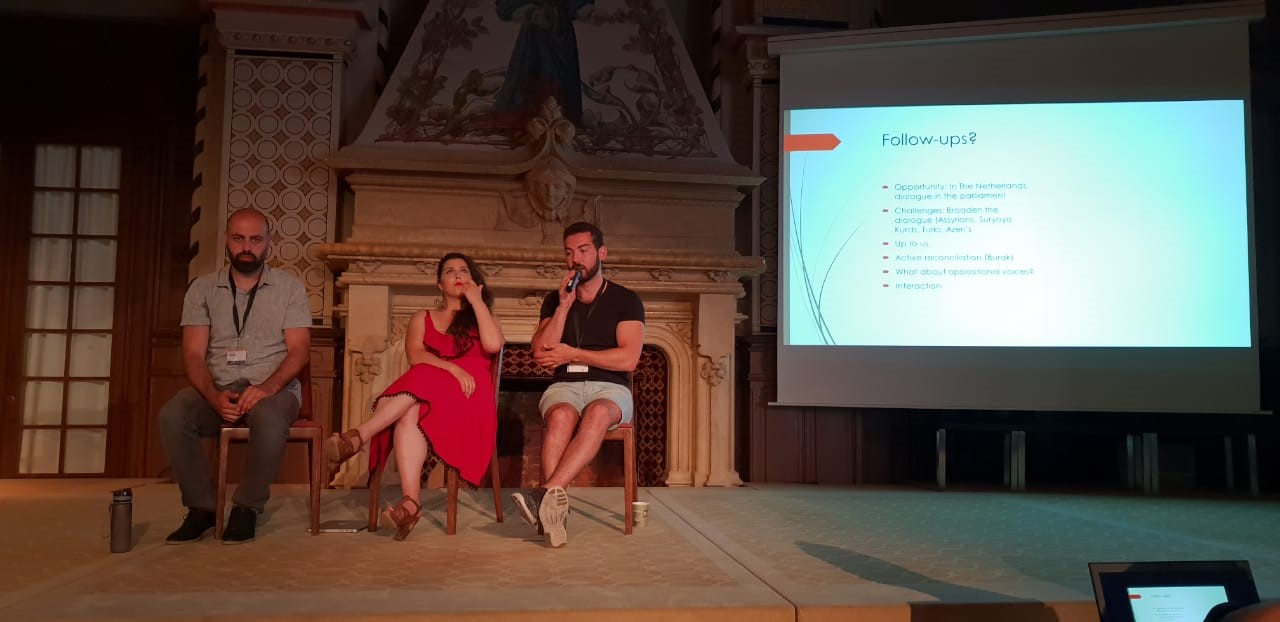
PART 3
This is the third and last part of the report, commenting on the 5 days gathering in Caux, where a group of 15 Armenians, Kurds and Turks from Lebanon, The Netherlands and Armenia participated in the Initiatives of Change (IoC) program ‘Addressing Europe’s Unfinished Business”.
Day 4 – Personal stories about change and action plans
The status of Roma in Romania
Simona Torotcai (Roma activist) and Diana Damsa (Centre for Social Transformation) are both from Romania. The latter belongs to the Romanian majority and Simona to the Roma minority. In a dual presentation they took us through a journey of prejudices, neglect and segregation towards more awareness and cooperation between these two communities in Romania.
Diana said she had zero contact with Roma people and that the situation in Romania was not about diversity, but about uniformity. In classes Roma were always used as a ‘bad example’, she was taught that ‘they were dirty’, ‘disorganized’ and that Romanians were supposed to be ‘superior’. These feelings are still present in Romania.
Simona had a difficult time in coping with this status-quo. On the one hand, there was the high-demanding mainstream society which discriminated the Roma’s, and on the other hand she felt not comfortable within her own group, ‘who sticked together’. She had to proof herself as a Romanian and felt ashamed about her Roma background.
Diana went on a IoC trip to India, which was also an internal journey with regards to her prejudices about Roma. She was confronted by the lack of knowledge about the Roma. How they suffered during the Holocaust, for example. ‘I wanted to reach out, build trust and face prejudices. I discovered that a lot of Roma choose to be invisible, just to protect themselves.’
Simona also went on a journey. She tried to quit her behavior that could be described as an unending strife of ‘being liked by Romanian society’. ‘I accepted who I am, and started to speak out and put Roma issues on the mainstream agenda’.
Jo Berry and the IRA
The next story of personal change was from Jo Berry, founder of ‘Building Bridges for Peace’.
Her story started in 1984, when her father, a conservative politician, was killed in an IRA-bomb attack. Two days after this horrific incident, she made a decision: ‘I’m not going to have an enemy. I wanted to understand the people who killed my father.’
Belfast was a warzone back then. With British soldiers all over the place. She met people from the IRA, but also loyalists and ex British soldiers. I wanted to understand what made them think that violence was the only option. Than finally, in 2000, she was able to speak with the man who killed her father. Sitting in a room, she went through a lot of emotions and thoughts like ‘he doesn’t look like my idea of a terrorist’. When he started to speak she heard all kinds of justifications for the bomb-attack. He talked in the we-form and spoke endlessly about ‘our community’, that violence ‘worked’, because it led finally to the peace process in which the IRA got their ‘political platform’. After a while he stopped talking and said: ‘I don’t know who I am anymore, and what to do?. That was for Berry the moment that she saw that he also wanted to take a journey, apart from the political hat, which he he had taken off by showing a vulnerable side.
So he went from ‘being political to the heart’, to a disarmed posture, he couldn’t stay righteous all the time anymore, and apologized for his act. That apology was for Berry a recognition of the humanity of her father. ‘Since then I am involved in the non-violent restorative approach. We need safe spaces where stories can be heard. The killer of my father is not just that. He is also a friend, cousin, and many other things. It is important to think together about how to create change.’
Third Armenian-Kurdish-Turkish dialogue: ‘Work-session one’
In this meeting we started with where we left yesterday: an action-plan and follow-up after Caux. What are the next steps? How are we going to engage with each other structurally? John Bond was also present and said ‘that there are always opportunities for people who are serious. And since you are serious, it is important to make steps. We did it in one night in Australia for the sorry-campaign for the aboriginals’. Bond’s words revealed an interesting drive and we started to note things down. And from then things went fast…
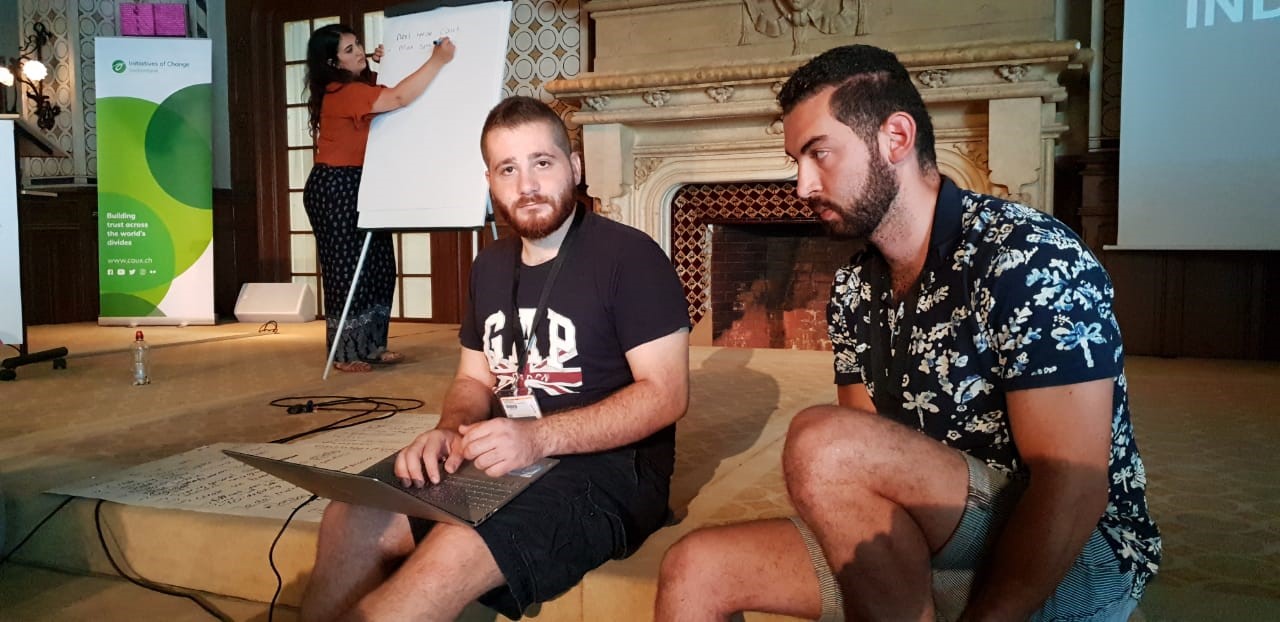
After setting up the structure of a possible organization, we made another appointment to see each other again in the evening and listened to Nvard Loryan’s presentation about the measurement of peace. The economics of peace can be an interesting tool to substantiate peace movements with raw numbers. Another interesting point is the difference between negative peace (the absence of fear and violence) and positive peace (institutional approach for creating peace, and the free flow of information). The Global Peace index also reveals numbers about the costs of violence.
Fourth Armenian-Kurdish-Turkish dialogue meeting:
‘work-session 2’
It was a rather interesting place (at the bay in Montreux) to have another work-session, but it all worked out well. Everybody took a seat. First we decided to pick dates for the reviews and contact moments after we returned home. After that we took a long round up, without comments and interruptions, in which everybody could say how he or she experienced Caux 2018 and the goals for the future with the Armenian-Kurdish-Turkish dialogue.
After everybody finished, we took two taxi’s to CAUX. This was the formal ending of the dialogue in Caux. We have made agreements. Now it’s up to us to fulfill the commitments.
Day 5, 27-7-2018, Final day
On the final day of the Caux Forum for ‘Addressing Europe’s Unfinished Business’ we watched an amazing performance of The Lion King & Titanic, prepared in the training tracks course of Txema Perez.
The next speaker was ‘key listener’ Mike Brown who reflected on ‘key thoughts and themes’ during the conference. Firstly, he made a distinction between violent communication and non-violent communication. An interesting sentence spoken out by Lord Ashdown on the first day, in which ‘second-generation Muslims’ in England were indirectly linked to terrorism, was used as an example of how otherization starts with language. ‘We should focus on inclusive language instead’, Brown underlined.
The need for cooperation between organizations is crucial to face the challenges of Europe, which are xenophobia and nationalism. Negative forces are also networking.
The values of forgiveness and love and the key insight that ‘behind every opinion, there is a human being’ are the leading thoughts here. Safe spaces are good, but ‘courageous spaces’ are maybe more important, in which people are encouraged to speak out. Peacemakers shouldn’t become a bubble, they should be working in the field they problematize.
With these words in mind, we said goodbye to each other, but we will meet again.
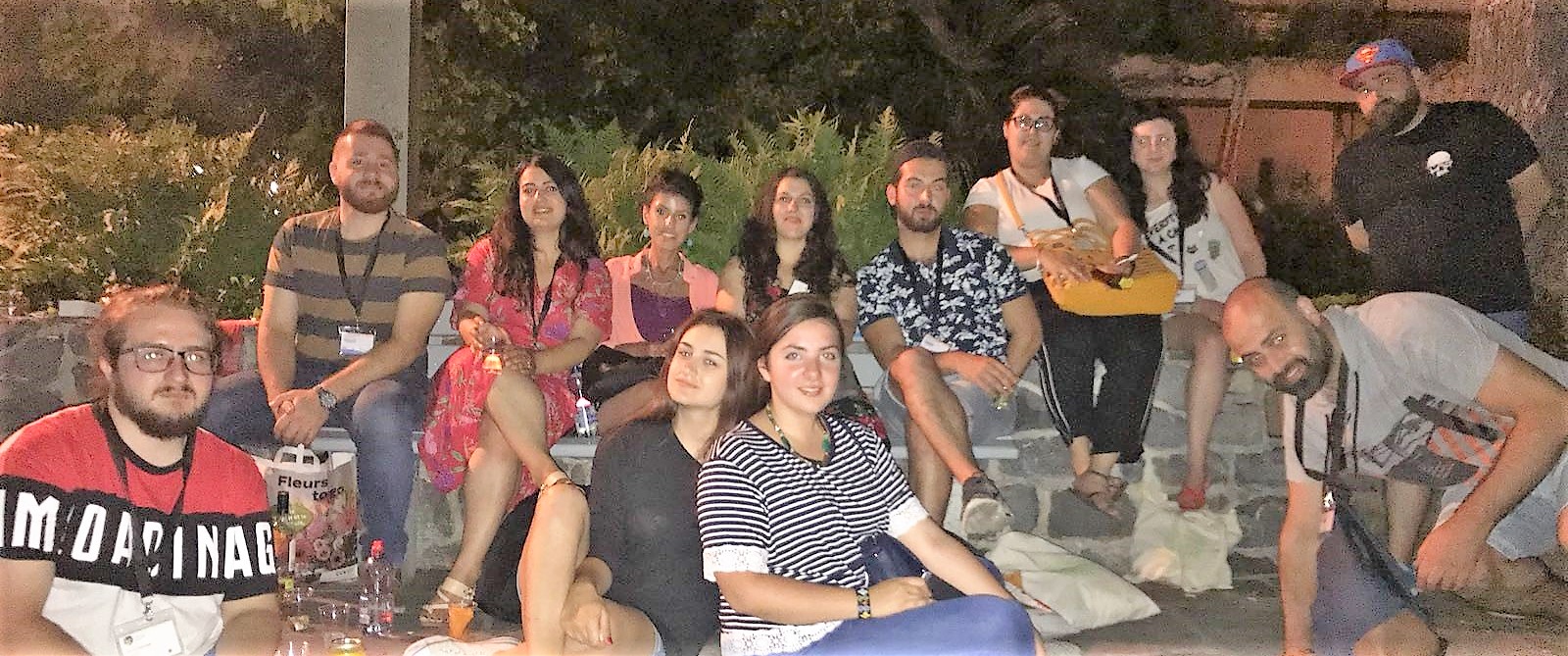
Geschreven door Tayfun Balcik
